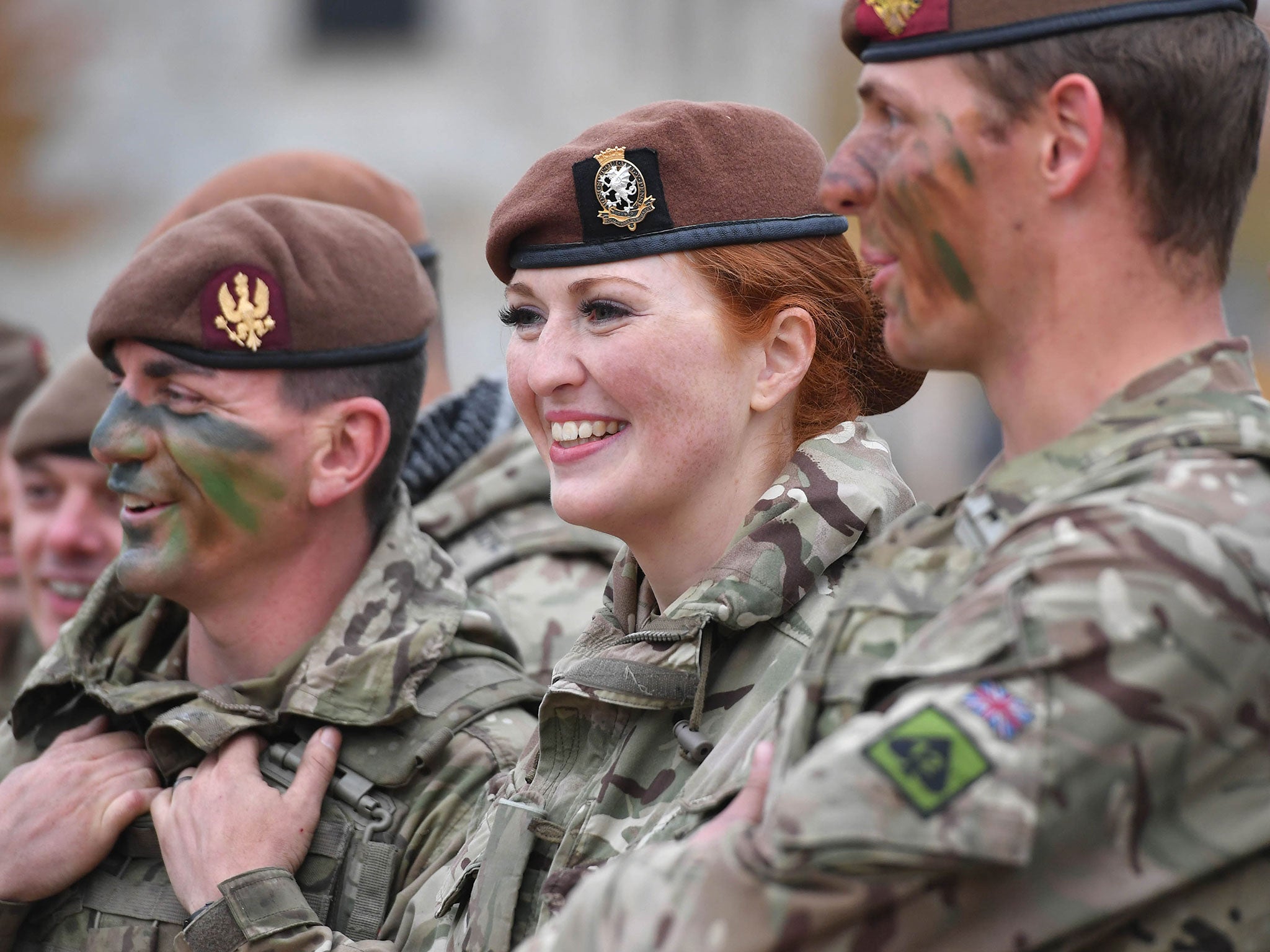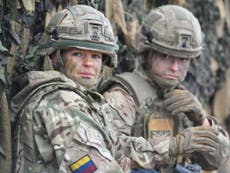Women were kept out of infantry roles to make men more comfortable until today – that's shameful in itself
Why should it be women’s responsibility to make themselves scarce because someday a man might fancy her a little too much and get distracted from the whopping great AK47 being shot at him?


As of today, for the first time in history, all roles in the British military are open to women. That’s over 2,000 years since Boadicea rode her horse-drawn chariot into battle against the Roman Empire; 871 years since Eleanor of Aquitaine led an army of 300 women to Jerusalem in the Second Crusade of 1147; 589 years since Joan of Arc cropped her hair, slipped on men’s armour and led French troops to victory against the English at the besieged city of Orleans. That’s not to mention Queen Cleopatra, the Greek Amazons and Margaret of Angou. I could go on.
In other words, women have been going to war for centuries – often winning. So why has it taken centuries for them to be formally able to serve in close combat on the front lines?
Announcing the news, the Ministry of Defence said that women currently serving in the Army are now able to transfer into infantry roles and those not presently serving will be able to apply to fight on the front lines from December, with new recruits training for the infantry and the Royal Marines to commence early 2019. Up until 2016, women were not permitted to serve in ground close combat roles at all.
Defence Secretary Gavin Williamson said that the changes “are aimed at creating opportunities for individuals from all backgrounds and making the most of their talents. By making all branches and trades of the military open to everyone, regardless of their gender, the Armed Forces are building on their reputation of being a leading equal opportunities employer.” Hard to see how embracing gender equality today might allow you to “build on” an existing reputation of excellence in equal opportunities; surely this is just the starting point. Nevertheless, any move away from gender-based discrimination is a positive move.
Naturally, the breaking of this seemingly sensible news has been met with the sort of social media response most feminists have become accustomed to dealing with. There’s the age-old yawn-a-thon argument of women being “Our mothers!” “Our daughters!” “Our sisters!” “Our wives!” and therefore too weak or too precious to be allowed to get their hands dirty or their rifles out. It’s always disheartening when women are qualified by their relationship to other people, as if we can only appreciate their abuse, loss or injury in those terms, rather than by simply thinking of them as human. But I digress.
The Twitterarti aren’t the only people against this news. When David Cameron announced in 2016 that women would be allowed to perform combat roles, former SAS commander Colonel Tim Collins said that, “The infantry is no place for a woman.” Calling the move “politically correct extravagance”, Collins said that bringing women into combat roles will “drag our infantry to below the required standard” because they are “physically weaker than men.” Of course, there’s a very easy way round this: set one physical standard and allow any people – emphasis on people – who hit that standard to take up the job.
Army Chief Colonel Richard Kemp said that introducing women into close combat roles would be a move that would be “paid for in blood,” and would “reduce the capability of the infantry, undermine our national defences and put lives in danger.” Exactly how that would come about remained unclear.
In 2002, then Defence Secretary, Geoff Hoon, said he was not prepared to lift the ban on women serving on the front line because officials were concerned that women’s presence might distract men – either because of their innate need to protect women, or simply because of sexual attraction. A report into the matter, published in 2010 by Berkshire Consultancy and which the Ministry of Defence relied on for their position against including women, stated that: “A significant number of men felt that, despite having had positive experiences of women, they would not want women in the infantry – there was a feeling amongst many that they would not feel comfortable asking a woman to close with and kill the enemy at very close range, and that they were concerned about the woman's response to this situation arising. This final step is felt to be different and a step too far.”
Once again, women were being penalised because of male behaviours or sexual “needs”, and male assumptions about how they might act (no doubt based on tired, sexist stereotypes.) Why should it be women’s responsibility to make themselves scarce because someday a man might fancy her a little too much and get distracted from the whopping great AK47 being shot at him? Why should every woman in Britain be locked out of a job because a couple of men thought they might get hysterical in really tough situations?
It should go without saying that, to be able to serve in the infantry, women – just as men – will need to pass certain tests. Despite suspicions from some social media conspiracists that these tests will now be made “women friendly” with a dropped pass requirement, this has not been suggested by the Army at any point. As far as anyone can tell, that’s just right-wing snowflake scaremongering by people who would rather have their wives in the kitchen than in khakis.
The 2016 decision to include women in these roles - which will include carrying heavy supplies long distance and hand-to-hand combat - followed research by the Army that same year that suggested that of the 7,000 women then serving, just five per cent would likely pass the infantry assessment. Now five per cent isn’t an enormous number, but at the time of the study, that amounted to 350 women – not exactly a small supply of additional soldiers, given that the Army appears to be desperately trying to increase enlistment with adverts in every cinema.
Williamson announced today that “the military does not necessarily expect large numbers of women to apply for ground close combat roles”, but that’s not the point. The British Army concluded from the study that women would not have any effect whatsoever on a unit’s ability to fight.
Female soldiers are just as worthy as their male counterparts – history has proved this to be true. And any physiological differences between the sexes should be utilised to create a more versatile army, not to block perfectly good soldiers from serving because they’re invading male territory. The Australian military opened combat roles to women in 2011. Germany did it way before in 2001. And women in the US – a country which just allowed Brett Kavanaugh onto its Supreme Court – have been serving in front line roles combat roles since 2013. That women are being allowed into these roles is not the thing we should be concerned about. If we should be angry about anything, it’s how frankly shameful it is that it took us this long to get this far.


Join our commenting forum
Join thought-provoking conversations, follow other Independent readers and see their replies